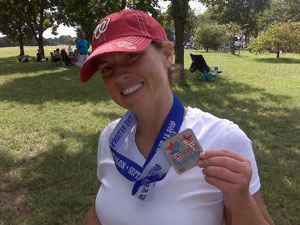 This past weekend, I competed in my first triathlon. The race course consisted of 1.5K swim, 40K bike, and 10K run. I can’t tell you how much fun I had. From learning how to swim and cycle in the first place to learning how to rip off a wetsuit and clipping in to the bike, tackling a triathlon promises adventure for everyone who dares to do it. The craziest part for me was definitely the swim. Imagine humans swimming over and into each other. I was smacked on the back, legs, arms, head, and face. Thankfully, I got out in about 39 minutes. I managed to develop “ulnar palsy” (temporary numbness in the ring and pinky finger from pinching on the ulnar nerve while cycling) and acquire several bumps, scrapes and bruises — and that’s just from the biking!
This past weekend, I competed in my first triathlon. The race course consisted of 1.5K swim, 40K bike, and 10K run. I can’t tell you how much fun I had. From learning how to swim and cycle in the first place to learning how to rip off a wetsuit and clipping in to the bike, tackling a triathlon promises adventure for everyone who dares to do it. The craziest part for me was definitely the swim. Imagine humans swimming over and into each other. I was smacked on the back, legs, arms, head, and face. Thankfully, I got out in about 39 minutes. I managed to develop “ulnar palsy” (temporary numbness in the ring and pinky finger from pinching on the ulnar nerve while cycling) and acquire several bumps, scrapes and bruises — and that’s just from the biking!
The triathlon took me 3 hours and 2 minutes to complete and I estimate that I burned 2,000 calories! In fact, once I got my appetite back I was hungry all day! Clearly, my metabolism was on overdrive!
In this kind of race, good nutrition is paramount to have a strong finish. But if you just focus on what you do during the event, you’re too late. You need to fuel well all during your training to maximize the benefits. Most importantly, you need to take care to deliver the right nutrients 1-2 days before the competition. That’s what this article is all about.
Carbs are King
For endurance events, carbohydrates are the almighty nutrient. Consuming adequate carbs allows optimal muscle glycogen storage. The glycogen is used during the event, when you need it most. When you eat enough carbs you spare your muscle protein (you won’t break down muscle for energy – a process called gluconeogenesis – or making new glucose). Glucose is the basic unit of all carbohydrates. If you don’t eat enough carbs, you will actually use amino acids (muscle protein) for energy and you don’t want to do that.
The last two to three weeks before a big race, your exercise tapers off, but if you keep up the high carbs, you will actually “carbo-load” or store glycogen for the race. This is a good thing.
Healthy Carbs
Choose healthy carbs like those found in fresh fruits, low-fat and fat-free dairy or soy, potatoes, beans, and hearty whole grains like brown rice, quinoa, and whole wheat bread products.
Healthy Sports Meals (please note, any meal plan should be individually developed for the athlete’s needs and preferences)
- whole wheat bagel with almond butter, banana, and fat-free milk
- Submarine tuna sandwich with veggies, salted pretzels, orange, and 1 cup minestrone soup
- 1.5 cups black beans and rice topped with 3-4 ounces of tofu or the meat of your choice, garden side salad with oil-based dressing, and a cup of vanilla low-fat frozen yogurt with 1 tablespoon carob chips
How Many Carbs?
The ideal amount of carbs depends a lot on the length of the race and the athlete’s weight, but it is generally somewhere in the range of 5-10 g/kg body weight. This can seem like a lot of carbs in the 7-10 g/kg range, but if the athlete is in a healthy weight range and working out for two hour blocks most days of the week, their calorie needs are way higher than those who pop in an aerobics class a few days a week.
